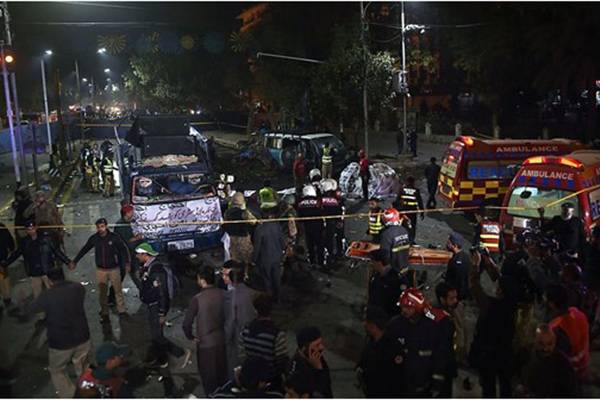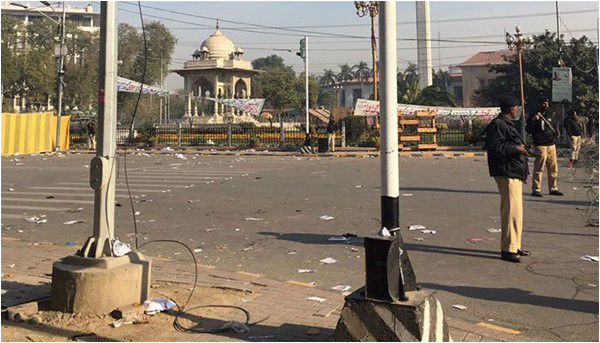
The Lahore attack reminds us of some stark realities facing us all. First, the dithering and politicking by the indifferent ruling elite continues to compromise the state of preparedness of the security apparatus. Second, a pliant bureaucracy and police, largely under the thumb of the prime minister and chief ministers, play second fiddle to the ruling elite. Third, a few intellectuals still sympathetically pander to extremist ideologies, creating the space and justification for violence against the people and interests of Pakistan. Four, these circumstances are invariably exacerbated by the interference of a possible foreign hand via proxies such as the Jamaat-ul-Ahrar and other Tehreek-e-Taliban factions, all of whom, on the face of it, predicate and justify their violence against “infidel institutions” in the craven pursuit of the Shariah. In reality, they are all instruments of destabilization for Pakistan.
The claims for Shariah are at best a fiction since none of these non-state entities either possess the wherewithal or even a semblance of public support to capture the state of Pakistan to impose it. And so, whoever interprets this string of high-profile attacks as revenge exacted by angry and disenchanted Muslim brothers does so at the risk of self-delusion. The ground reality is that Pakistan is facing the atrocious consequences of a triangular proxy war. Entities such as Jamaatul Ahrar, the TTP or Lashkar-e-Jhangvi are a few of the ground manifestations of this war that has been a popular recommendation by people such as Ajit Doval, the Indian National Security Advisor, or Amrullah Saleh and Rahmatullah Nabeel, the former heads of the Afghan National Directorate of Security.
It is unsurprising, therefore, that “Operation Ghazi”, announced in a video recently released by the TTP Jamaat-ul-Ahrar, primarily targets the entire state of Pakistan. It has been named after Maulvi Ghazi Abdul Rasheed, the rebel cleric of Laal Masjid, killed in July 2007 by the Pakistan Army inside Islamabad. It lists all possible targets, including those in FATA as well as mainland Pakistan. Officials and developments point to several emerging patterns from this ‘operation’.
First, there are visible signs of former factions re-joining the TTP, which Baitullah Mehsud created in mid-December 2007, as Jamaatul Ahrar leaders have hinted at working under Mullah Fazlullah. Indeed, the Mehsud Taliban (Sajna group) already rejoined the main TTP on Feb 2.

Second, the regrouping is aimed at unleashing a wave of disruption and uncertainty to unnerve Chinese manpower that is busy working on several projects across Pakistan. Third, the primary objective is to project Pakistan as volatile and unsafe (and the Lahore incident has practically blown off the chances of the PSL cricket final in early March.)
Fourth, several attacks they have all joined hands against the civilian and military security apparatus much the same way in which they went after the security forces between 2009 and 2011. Factions of the TTP in Balochistan claimed an attack on the FC jointly with the Lashkar-e-Jhangvi’s Al-Alami. Al-Alami also claimed responsibility for a bomb blast in Kurram Agency on Jan 21 and another attack in Mohmand Agency. The strategy is to engage the security forces at various levels, inflict pain and sow uncertainty.
Fifth, the Ghazi Operation has lumped Ahle Tasheeh or Shia Muslims, Ahmadis, liberals, local and foreign NGOs together as “anti-Islam and anti-Pakistan” for what the extremists say is their advocacy of human rights, women rights and community awareness campaigns.) This outlook of the Ahrar is a paradox as a day after the attack, the deputy imam of Lal Masjid called it an anti-Islam and anti-state entity. And so, although the TTP Ahrar described the Lahore bombing as part of its Ghazi operations, at least on the face of it the Red Mosque condemned the attack. “The terrorism by the TTP Ahrar is not only destabilising Pakistan but is also defaming Islam and Jihad,” the deputy imam of Lal Masjid said in a statement released Tuesday.
The TTP vows to target them for their “infidel, and vulgar” teachings. Essentially this means that as unarmed civilians they have all been rendered a vulnerable group. Interestingly, though, the code of conduct of Operation Ghazi undertakes not to attack crowded places or public gatherings unlike with the previous, Operation Saut-al-Raad (Sound of Thunder). But the Jamaatul Ahrar list of targets for all practical reasons is also self contradictory; it advises against attacking public places but the Lahore bombing was organised at a crowded public place.
Also, it advises extreme vigilance and heightened security measures at UN’s World Food Programme operation sites. Sixth, the operation sets as its prime targets, the Pakistan Army, paramilitary institutions, civilian and military intelligence agencies, the judiciary and lawyers. The target list includes practically all key sectors of Pakistani society, including political parties and pro-government entities such as Aman Lashkars (pro-government armed militias and peace committees).
The list of targets is long and ambitious, a virtual declaration of war on the state of Pakistan; only popular and large entities such as the People’s Liberation Army under Chairman Mao Tse Tung or Che Guevara could possibly dream of embarking on such a lofty mission.
The only conclusion that one can draw from this is that instruments of destabilization are regrouping under Operation Ghazi to undo the gains of the Pakistan Army’s Operation Zarb-e-Azb and upset China-Pakistan Economic Corridor projects.
Such challenges require a much more coherent civilian-military apparatus; the army can undertake surgical, kinetic operations to clear and hold territories but cleansing, consolidating and undertaking development will only come if civilians act cohesively—by rising above politicking and according the police and intelligence systems the autonomy and importance they deserve to fight internal and external anti-state actors. Only pro-active, coordinated intelligence sharing can fend off the threats that are emerging from these motivated and sponsored non-state actors.
Imtiaz Gul heads the independent Centre for Research and Security Studies in Islamabad
The claims for Shariah are at best a fiction since none of these non-state entities either possess the wherewithal or even a semblance of public support to capture the state of Pakistan to impose it. And so, whoever interprets this string of high-profile attacks as revenge exacted by angry and disenchanted Muslim brothers does so at the risk of self-delusion. The ground reality is that Pakistan is facing the atrocious consequences of a triangular proxy war. Entities such as Jamaatul Ahrar, the TTP or Lashkar-e-Jhangvi are a few of the ground manifestations of this war that has been a popular recommendation by people such as Ajit Doval, the Indian National Security Advisor, or Amrullah Saleh and Rahmatullah Nabeel, the former heads of the Afghan National Directorate of Security.
Such challenges require a much more coherent civilian-military apparatus; the army can undertake surgical, kinetic operations to clear and hold territories but cleansing, consolidating and undertaking development will only come if civilians act cohesively
It is unsurprising, therefore, that “Operation Ghazi”, announced in a video recently released by the TTP Jamaat-ul-Ahrar, primarily targets the entire state of Pakistan. It has been named after Maulvi Ghazi Abdul Rasheed, the rebel cleric of Laal Masjid, killed in July 2007 by the Pakistan Army inside Islamabad. It lists all possible targets, including those in FATA as well as mainland Pakistan. Officials and developments point to several emerging patterns from this ‘operation’.
First, there are visible signs of former factions re-joining the TTP, which Baitullah Mehsud created in mid-December 2007, as Jamaatul Ahrar leaders have hinted at working under Mullah Fazlullah. Indeed, the Mehsud Taliban (Sajna group) already rejoined the main TTP on Feb 2.

Second, the regrouping is aimed at unleashing a wave of disruption and uncertainty to unnerve Chinese manpower that is busy working on several projects across Pakistan. Third, the primary objective is to project Pakistan as volatile and unsafe (and the Lahore incident has practically blown off the chances of the PSL cricket final in early March.)
Fourth, several attacks they have all joined hands against the civilian and military security apparatus much the same way in which they went after the security forces between 2009 and 2011. Factions of the TTP in Balochistan claimed an attack on the FC jointly with the Lashkar-e-Jhangvi’s Al-Alami. Al-Alami also claimed responsibility for a bomb blast in Kurram Agency on Jan 21 and another attack in Mohmand Agency. The strategy is to engage the security forces at various levels, inflict pain and sow uncertainty.
Fifth, the Ghazi Operation has lumped Ahle Tasheeh or Shia Muslims, Ahmadis, liberals, local and foreign NGOs together as “anti-Islam and anti-Pakistan” for what the extremists say is their advocacy of human rights, women rights and community awareness campaigns.) This outlook of the Ahrar is a paradox as a day after the attack, the deputy imam of Lal Masjid called it an anti-Islam and anti-state entity. And so, although the TTP Ahrar described the Lahore bombing as part of its Ghazi operations, at least on the face of it the Red Mosque condemned the attack. “The terrorism by the TTP Ahrar is not only destabilising Pakistan but is also defaming Islam and Jihad,” the deputy imam of Lal Masjid said in a statement released Tuesday.
"Operation Ghazi", announced in a video recently released by the TTP Jamaat-ul-Ahrar, targets the entire state of Pakistan. It has been named after Maulvi Ghazi Abdul Rasheed, the rebel cleric of Laal Masjid, killed in July 2007 by the Pakistan Army. Everyone is a target
The TTP vows to target them for their “infidel, and vulgar” teachings. Essentially this means that as unarmed civilians they have all been rendered a vulnerable group. Interestingly, though, the code of conduct of Operation Ghazi undertakes not to attack crowded places or public gatherings unlike with the previous, Operation Saut-al-Raad (Sound of Thunder). But the Jamaatul Ahrar list of targets for all practical reasons is also self contradictory; it advises against attacking public places but the Lahore bombing was organised at a crowded public place.
Also, it advises extreme vigilance and heightened security measures at UN’s World Food Programme operation sites. Sixth, the operation sets as its prime targets, the Pakistan Army, paramilitary institutions, civilian and military intelligence agencies, the judiciary and lawyers. The target list includes practically all key sectors of Pakistani society, including political parties and pro-government entities such as Aman Lashkars (pro-government armed militias and peace committees).
The list of targets is long and ambitious, a virtual declaration of war on the state of Pakistan; only popular and large entities such as the People’s Liberation Army under Chairman Mao Tse Tung or Che Guevara could possibly dream of embarking on such a lofty mission.
The only conclusion that one can draw from this is that instruments of destabilization are regrouping under Operation Ghazi to undo the gains of the Pakistan Army’s Operation Zarb-e-Azb and upset China-Pakistan Economic Corridor projects.
Such challenges require a much more coherent civilian-military apparatus; the army can undertake surgical, kinetic operations to clear and hold territories but cleansing, consolidating and undertaking development will only come if civilians act cohesively—by rising above politicking and according the police and intelligence systems the autonomy and importance they deserve to fight internal and external anti-state actors. Only pro-active, coordinated intelligence sharing can fend off the threats that are emerging from these motivated and sponsored non-state actors.
Imtiaz Gul heads the independent Centre for Research and Security Studies in Islamabad

